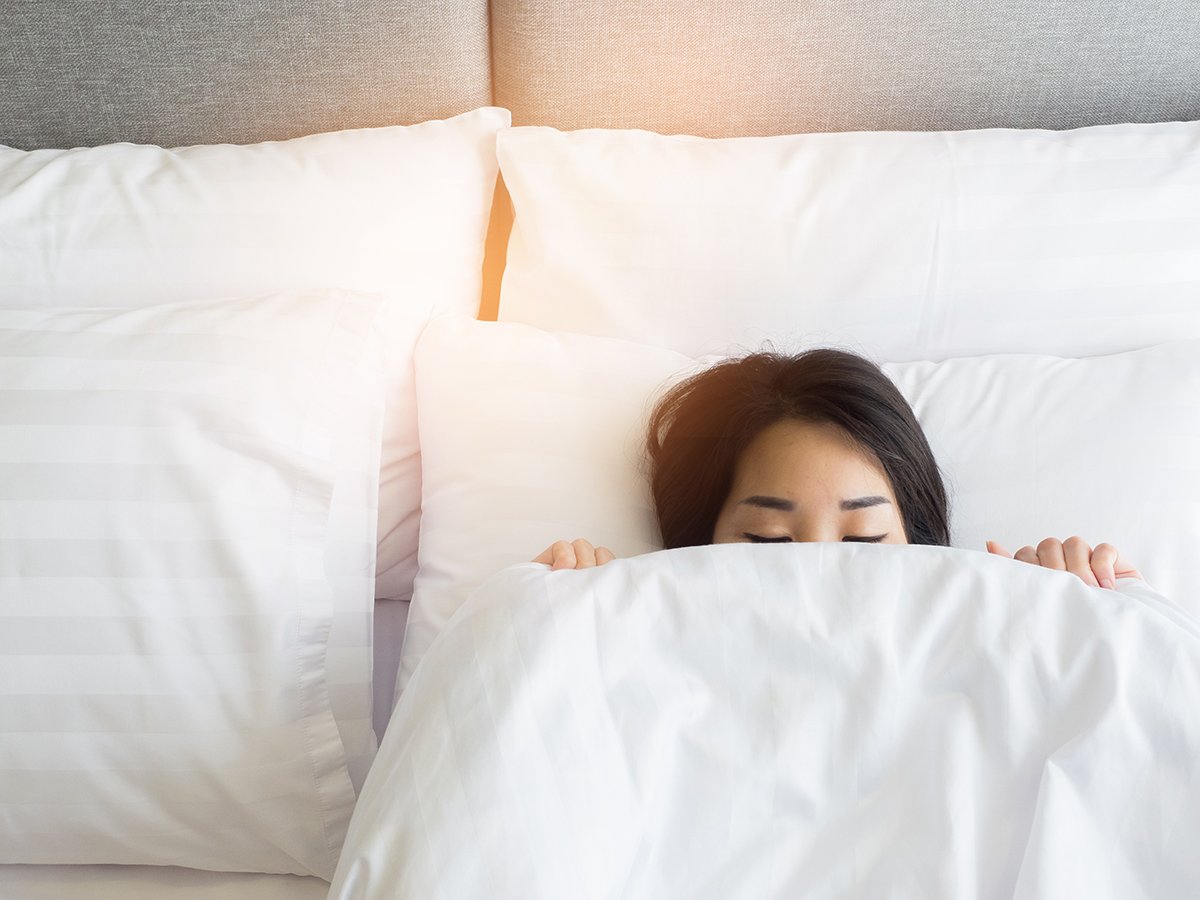Does fresh air lead to better sleep? There’s some evidence that air quality can play a role in the quality of our sleep, but it may not be as simple as cracking a window at night. We spoke with Dr. Carlea Weiss about the benefits and drawbacks of opening bedroom windows at night for sleep quality. Plus, what you can do to improve the air quality in your sleep environment.
[Editor’s Note: The information provided should not be considered a substitute for professional advice. Please consult a sleep doctor or other medical expert if you have questions related to your own health.]
Does Better Air Quality Really Improve Your Sleep Quality?
There does appear to be a link between air quality and sleep quality. In a 2020 review of 22 studies, all but one reported a generally positive association between exposure to air pollutants and poor sleep quality. A small study looked at the effects of air purification in a two-week pilot study with 30 healthy adults. Participants used air purifiers with and without filter placebos to determine whether they slept better with cleaner air. Those who slept with a purifier filter reported increased sleep time, leading researchers to conclude that improved air quality had a positive effect on sleep outcomes.
Another small study looked at the impact of open bedroom windows as a means of ventilating the bedroom for better sleep. The study included 40 bedrooms, some of whom slept with windows open, some with interior doors open, and some with windows and doors closed over a period of two weeks.
The researchers found that the participants in the “open” window or door group had improved indoor air quality, but lower levels of carbon dioxide, suggesting more ventilation in their bedrooms.The participants with an open window or door also slept with better ventilation and had slightly deeper, longer sleep with fewer awakenings during the night.
“Unfortunately, opening the windows does not always imply improved indoor air quality,” points out Weiss.
Considerations when Sleeping with Open Bedroom Windows
Depending on where you live and the time of year, sleeping with your windows open could create issues that make it hard to fall or stay asleep. Here’s what to consider before cracking that window.
Allergies
Weiss explains that sleeping with the window open can increase the entrance of allergens such as pollen, dust, and chemical pollutants from surrounding areas in the sleep environment. That can trigger allergies and asthma, which can lead to increased mucus production, coughing, and sinus congestion, all of which are likely to interfere with a restful night.
Weather
“Sleeping with windows open increases exposure to temperature changes overnight,” says Weiss. Opening the window to cool a stuffy room may be perfect when you climb into bed, but if the temperature drops or inclement weather kicks up, you could find yourself waking up with a chill or to soggy sheets.
Noise
Keeping the windows down helps dampen noise in the surrounding environment, whether that’s the neighbor’s barking dog, traffic or the noisy street below. When you open the windows for fresh air, you may ensure a great sleeping temperature but find the noise level increases too much to easily fall asleep. In that case, consider earplugs or a white noise machine.
Safety
Safety can be another consideration. If your bedroom is on the ground floor, opening the windows may expose you to an increased likelihood of break-ins.
The Pros and Cons of Sleeping with Open Bedroom Windows
Pros
- Fresh air. Cracking the window can be a great way to ventilate a hot, stuffy bedroom. Since heat exposure is associated with wakefulness, an open window may be a simple way to keep a bedroom cool.
- More comfortable sleeping temperature. According to Weiss, the ideal sleep temperature is 65 to 67 degrees Fahrenheit. It’s an important part of sleep hygiene. By opening the window, you may be able to manage your bedroom temperature without using the air conditioner or heater.
- Soothing sleep sounds. Depending on the time of year, opening the window may bring in ambient sound that’s actually conducive to sleep, like running water, ocean waves, or crickets.
Cons
- Potential allergen exposure. Opening the window can expose you to allergens that you’ll inhale while you sleep. Dust, particulate matter, and in the spring and fall, in particular, higher pollen counts, may all blow into your bedroom and trigger allergies or asthma.
- May increase noise level. Another component of good sleep hygiene is minimizing disruptive noise. That may be difficult to manage when you open the window and let outside noise in.
- Weather and safety considerations. Pay attention to overnight lows if you open the window. Temperatures can drop overnight, or inclement weather, like rain or high winds, can be disruptive to sleep if the window is left open.
How to Improve Air Quality With Your Windows Closed
If it’s too noisy, too cold, or simply unsafe to sleep with the window open, you can still improve air quality and ventilation in your bedroom for a better night’s sleep.
- Use an air purifier. If the goal is cleaner air, you can do that with an air purifier. An air purifier will help reduce allergens and contaminants, and the sound of the machine may even offer a white noise benefit.
- Turn on a fan. Some people like the breeze that comes from an open window. If that’s the case, turning on a fan can circulate air for the same benefit.
- Regularly replace filters in the air conditioning and heating systems. Weiss recommends replacing filters in HVAC equipment, either by yourself or with professional service, to help keep your indoor air cleaner.
- Clean the bedroom regularly. “We should strive to promote a clean sleep environment,” advises Weiss. In addition to washing your sheets and dusting regularly, she advises removing items that accumulate dust and pollen and increase carbon dioxide and volatile contaminants from items like paint, potted plants, and refrigerators.
Final Thoughts
While there is research to support the idea that fresh air promotes better sleep, opening the window may not be the best way to improve indoor air quality. “Research shows that air pollution and carbon monoxide decrease sleep quality,” explains Weiss, and cracking a window may flood your bedroom with those irritants. Noise, light pollution and allergens like pollen and dust may also increase when you sleep with the window open. “If you’re unsure about it, the recommendation is to close the windows and use an air purifier,” says Weiss.
Frequently Asked Questions
Is it better to sleep with the windows open or closed?
According to Weiss, this varies depending on the air quality in your environment. “If you’re unsure about it, the recommendation is to close the windows and use an air purifier,” she says. “Closed windows are also recommended during winter months.”
Is it healthy to sleep with the windows open?
It really depends on where you live. Opening the window may expose you to pollution or allergens that actually worsen the air quality in your bedroom. If you’re in an area with low pollution, however, keeping the window open might improve indoor air quality.
What temperature should I sleep with the windows open?
“The ideal sleep temperature is 65 to 67 degrees Fahrenheit, with or without windows opened,” says Weiss. Depending on where you live and the current weather, you may find it easier to maintain that temperature by keeping the windows closed.
[Editor’s Note: The information provided should not be considered a substitute for professional advice. Please consult a sleep doctor or other medical expert if you have questions related to your own health.]
Featured image: TuiPhotoEngineer/Shutterstock



